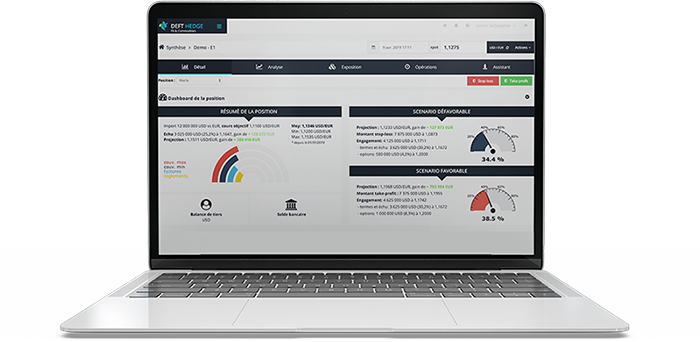Oil prices :
Discover our solution !

Among commodities, oil is certainly one of the most important on the financial markets and its price can be particularly volatile. The value of this product traded on the financial markets is influenced by multiple factors and must therefore be assessed as accurately as possible in order to avoid financial losses. In order to better understand how the price of oil and the various elements that influence its value, we return to this market in detail.
In order to help you in your transactions on the commodities market and particularly on oil transactions, DeftHedge now offers you its SaaS solution. Thanks to our commodity management tool, you will be able to considerably reduce losses during your transactions. To considerably improve your behaviour on this market, discover here the advantages of DeftHedge for a better knowledge of oil prices.
What is the price of oil ?
Despite competition from new energy sources, oil remains one of the most coveted products in the commodities market. In this market, the value of oil is constantly changing and is influenced by many factors.
The price of oil corresponds to the evolution of the price of this material which forms the basis of the oil market.
This value is determined by the various operators on this market and varies in particular according to supply and demand.
How does the oil market work ?
In order to fully understand the functioning of the oil market, it is necessary to distinguish between the two forms of this market.
Over-the-counter or “spot” market
The over-the-counter market brings together different players who make up supply and demand.
The supply of oil is represented by the companies that extract the oil, while the demand is determined by the refiners who transform the crude oil into a finished product (fuel, combustibles…).
Transactions between these two types of players are carried out by subsidiaries specialised in trading, mandated by the refiners.
These transactions are carried out with the aim of obtaining the quantities necessary for the refineries’ activity but also with the aim of generating short-term profits for those in charge of trading.
These transactions of physical maturities of barrels of oil are carried out on the “spot market”.
Futures market or “paper” market
Alongside this type of transaction, there are also forward or “paper” transactions.
This type of transaction is characterised by an agreement between the parties to buy and sell at an estimated future value.
On the producers’ side, this type of sale enables them to ensure that their goods are sold at a certain price, without being impacted by possible unfavourable variations.
In return for this security, they will not be able to benefit from any favourable changes in the price of oil.
On the buyers’ side, forward buying also allows them to invest in this material at a fixed price. These investors rely on price instability to hope to make a profit on the transaction.
The vast majority of futures transactions are carried out on the NYMEX and ICE, the two main futures markets.
NYMEX and ICE : the main oil markets
Financial transactions around oil therefore take place on the market places and in particular the NYMEX and ICE. It is on these markets that the price of oil will be set.
Nymex
The New York Mercantile Exchange (Nymex) is a market located in the United States, specialising mainly in the trade of precious metals and energy products (oil, gas, electricity).
Founded in 1972, this market is today the most important stock exchange for oil transactions.
THE ICE
The second main stock exchange is the ICE (IntercontinentalExchange) which was created in 2000. Unlike Nymex, where trading is done by auction, all negotiations are carried out on an electronic trading platform.
Created in the United States, it is mainly from London that oil negotiations are carried out.
What are the quotation methods for oil ?
The fact that there are several quotation methods for oil is explained by the fact that there are different qualities of oil. Today, there are about 160 qualities of crude oil on the world market. Of this wide variety of oil qualities, only 4 are actually used as a reference for setting oil prices.
Brent
On a European scale, Brent is the benchmark crude oil which is listed on the ECI. This type of light oil is extracted from fields located in the North Sea, between the Shetland Islands and Norway.
WTI
Mainly quoted on the American market, WTI (West Texas Intermediate) is a light oil which is the benchmark for quality oil since it has a lower level of sulphur than Brent.
Dubai Light
Extracted in the Persian Gulf, this type of oil is mainly destined for the Asian market.
Arabian Light
Produced by Saudi Arabia, this type of oil serves as a reference in the Middle East.
What influences the price of oil ?
Oil is one of the most valuable raw materials and its value can vary greatly according to many indicators. Some of the main factors influencing the price of this commodity include the following:
Evolution and level of supply and demand
Oil quality
Natural factors and depletion of deposits
Geo-political factors (tensions, conflicts, geostrategic decisions)
Legal Contexts
Stock levels
Investment cost for extraction
Alternative energy supply
Cost of transport
As a strategic material, oil is therefore impacted by many factors and can see its value fluctuate particularly significantly depending on international events.
Who sets oil prices ?
As there are different qualities of oil and as this product is particularly affected by geopolitics and international events, the price of oil is subject to permanent variations.
On the exchange markets, the value of this product is nowadays set by different actors:
Oil and gas groups
Representatives of oil-producing countries (OPEC)
Hydrocarbon traders
Banks specialising in oil trading
What is the global evolution of oil?
Despite the questioning of this energy in relation to its environmental impact and the risk of depletion of deposits, oil remains today one of the most used and most demanded raw materials in the world.
With the development of emerging countries in particular, the global trend will tend to remain upward.
Although the value of this material is particularly volatile, oil remains today one of the most traded commodities in the world.
How will the DeftHedge solution help you in monitoring oil prices ?
Given the characteristics of the oil price and its evolution, the management of oil transactions can be complex for companies.
In order to provide professionals with the best possible support in their management of the commodities market, we have designed our DeftHedge SaaS solution.
This software allows you to simplify and optimise the daily management of your portfolio of transactions on the commodities market and particularly on the oil markets.
By opting for DeftHedge, you will have access to numerous functionalities:
Oil price and currency management
Automation of tasks for daily management
Development of financial strategies
Data centralisation and security
Optimisation of financial gains
Our tool has been specially designed to help professionals improve their management of purchases and sales of raw materials on the financial markets.
In case your business requires an investment in oil, our SaaS solution will be a real asset to improve your strategy and identify the right moments for your purchases.
As oil is one of the raw materials with many uncertainties regarding the evolution of its value, it is important to use the right tools to best guide your strategy.
In order to help you as much as possible, DeftHedge offers you to simulate different buying and selling strategies thanks to the “SmartStrategy” tool which will take into account the different information about your business.
Particularly complete and of very high quality, our management tool will quickly become an essential part of your daily management.
Indeed, thanks to DeftHedge, you will have at your disposal a complete software to pilot and adapt your strategy as well as possible according to the evolution of the oil market.
The effects on your business will be felt quickly because you will be able to considerably reduce your losses in your various oil transactions.
To make it easier for you to get to grips with our tool, DeftHedge experts will be at your side to customise the software and thus make the most of all the functionalities.
On a daily basis, this financial forecasting software will enable you to reduce your strategic risks and to adapt your purchases to the oil market, which is particularly volatile.
To discover all the advantages of our SaaS solution, do not hesitate to contact our teams and take advantage of their expert advice to get the most out of our tool.
